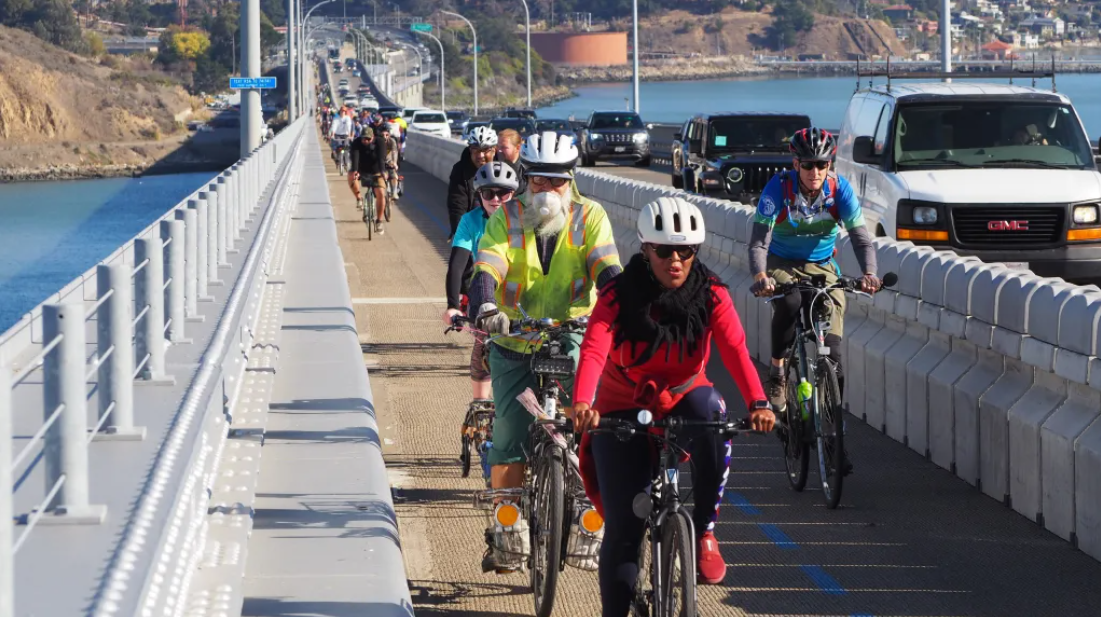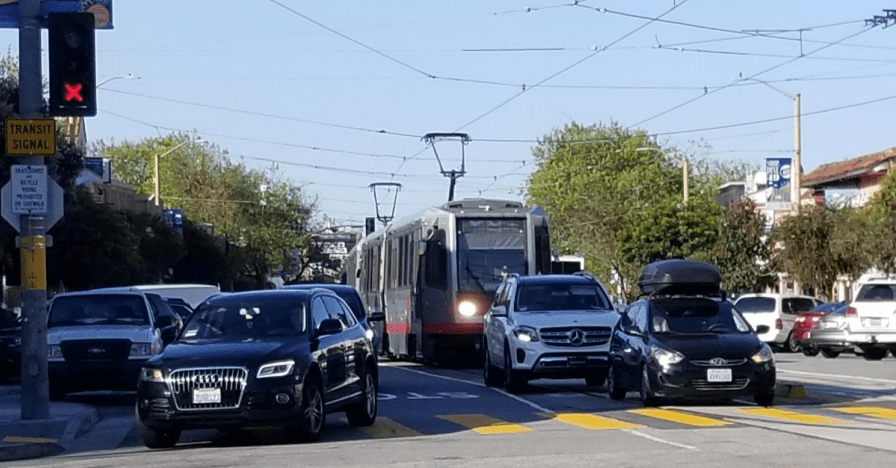SFPark: “It’s Really an Exciting Time in the Meter World”
4:21 PM PDT on May 21, 2009
 Signs for the new SFPark pilot. Photos: Matthew Roth
Signs for the new SFPark pilot. Photos: Matthew RothThe
Port of San Francisco last week installed the first 8 of more than 100
new multi-space meters along the Embarcadero from the Ferry Building
south to AT&T Park in what will become San Francisco's new pilot in
dynamic parking management, SFPark.
The Port meters are the first of what will be a year and a
half trial with 6,000 curbside spaces and 11,500 garage spaces in seven
pilot areas around the city, most of them downtown and in heavy-traffic
tourist destinations (see map below).
As we've reported, it will be the largest pilot to test
parking icon Donald Shoup's theories about parking vacancy targets and
measure the results of the data collection with precision unmatched by
any other city. As Shoup said to Streetsblog about the SFPark pilot, "You can't manage what you can't measure. [This] will
allow San Francisco to measure what has never been measured before:
real-time occupancy rates for curb parking. Once city managers
understand what these occupancy sensors can do, they'll wonder how
they ever got along without them."
The
occupancy sensors, which have not yet been installed on the Embarcadero, will network wirelessly with meters and send data to
transmission boxes mounted on poles and buildings. The various
transmission boxes throughout pilot areas create a peered network that
gives parking managers the ability to access real-time payment and
occupancy data, which will greatly refine enforcement efforts, as well
as real-time meter functionality, thus making maintenance and repair
much more efficient.
MTA spokesperson Judson True was very upbeat about the progress that SFPark
represents for the city and suggested this is merely the beginning of
managing streets and parking in a much more sophisticated manner.
This represents a degree of coordination that we've never seen betweenthe SFMTA and the Port, and we're excited because we think about allthe policy progress this represents, but we know that this is betterfor residents and visitors of San Francisco. The goal of thecoordination is to improve the experience of people using meters aroundSan Francisco.
Much of the funding for SFPark comes from federal funds as part of San Francisco's Urban Partnership Agreement
for congestion reduction. True explained that they have yet to select
the vendor for the occupancy sensors and networking, but he was
confident that all the pilot areas would be operational by fall 2009.
He likewise expressed optimism that future funding from the Urban
Partnership program or other federal sources would be available, given
San Francisco's unique position to demonstrate the potential for
dynamic management throughout so much of the city.
 The new pay stations on Embarcadero
The new pay stations on EmbarcaderoEach
new multi-space pay station on Embarcadero replaces 8 to 10 single-space meters, which
have been covered with fabric hoods that direct motorists to pay at the pay station according to the number assigned on
the hood. Pay stations will still accept coins, but now allow users to
pay by credit card and MTA Smart Card debit cards. In all, the Port
will replace nearly 1000 meters along Embarcadero with the new stations.
Tina
Olson, CFO for the Port, shared True's excitement and explained that
the Port viewed the parking pilot from the perspective of improving
convenience for users. "If you go up and down the Embarcadero near
Fisherman's Wharf, it's packed and you can't find parking, but if
you're south of the Bay Bridge, it's empty. When something is priced
appropriately, it's available. If people want
parking spaces to be available, they need to be priced appropriately."
Olsen
explained that the Port was not part of the Urban Partnership grant, so
they are looking to improve revenue from facilities that are currently
under-priced. "The Port is a unique animal," she said. "We're private
sector on the revenue side, but government on the expenditure side. We
have to make money based on the use of our facilities and we didn't
seem to be optimizing our revenue nor our management of the spaces."
Like
the MTA, Olson explained that the Port made an agreement with its
governing commission to adjust parking rates in the pilot areas up or
down by a maximum of $.50 every 4-6 weeks. Special events are a different
matter. With many of the new meters located near AT&T Park, the
Port will experiment with event pricing pegged to nearby garage rates,
meaning parking at the curb near the ballpark during a game will cost
around $20.
Building from the results of the Port's pilot study on parking management from 2006 [PDF],
they will be much more fluid with time limits where that is
appropriate. Olson said that in their pilot study area around
Fisherman's Wharf, nearly 95 percent of drivers parked at the curb for
two hours or less, so they will keep the two hour limit there. South
of Bryant, where there is less competition for space on non-event days,
parking limits will be as long as 12 hours for paid spaces. The Port's
meters will also run until 11 pm.
When asked whether the Port
is worried about backlash similar to what happened in Los Angeles when
parking meter rates were raised substantially without thorough public
outreach, Olson said that they have seven public advisory committees
that have been involved with this for three years and they've done
ample outreach.
"There will be some people we didn't hit, but
we've hit all the people who are most interested in the public realm.
Now when I talk about it with them, their eyes glaze over and they ask
when they're going to be implemented."
She added: "This
represents the future of parking management in San Francisco and we're
on track to deliver it and the project is moving forward well. It's
really an exciting time in the meter world."
 Single space meters have been covered with instructions for paying at new multi-space pay stations.
Single space meters have been covered with instructions for paying at new multi-space pay stations. SF Park Pilot Areas - Richmond and West Portal control areas not featured
SF Park Pilot Areas - Richmond and West Portal control areas not featuredStay in touch
Sign up for our free newsletter
More from Streetsblog San Francisco
Commentary: Merchants Are Getting People Killed
The number one local obstruction to curbing traffic violence is commerce and merchant groups.




